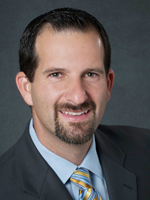A new type of school choice program aimed at serving special-needs students in Florida won bipartisan support during its first legislative committee vote Tuesday.

Rep. Michael Bileca, R-Miami, chairs the House panel that has proposed individual education accounts for special-needs students.
Several Democrats on the House Choice & Innovation Committee joined Republicans in voting 11-2 for “personal learning accounts,” a school choice option that would allow parents with disabled children to use state education funds for a range of education-related services.
Other Democrats, like Ranking Member Joe Saunders, D-Orlando, voted against the bill but held out the possibility they might support it in the future.
"Vouchers are so controversial at times, but I think that you have an honest desire to help the families that were up here today," Saunders said. "I think there's a very legitimate need."
Parents of special-needs children came to Tallahassee to testify on behalf of the proposal, while the Florida PTA and statewide teachers union objected.
Mindy Gould, the PTA's legislative chair, said the group had "great concerns," and mentioned a 2006 state Supreme Court ruling that found the state's Opportunity Scholarship program unconstitutional.
The Bush v. Holmes decision struck down the voucher program, which was created under Gov. Jeb. Bush for students in struggling schools. But justices in the case also indicated that other programs, including those for special-needs students, may be "distinguishable" under the state constitution.
Under the House legislation, individual accounts would be available to parents of children with conditions like autism and cerebral palsy who qualify for the state's two highest support levels for disabled children.
The accounts could reimburse them for specific kinds of therapy or specialized instruction for their children. Funding would be based on the formula for the state's McKay Scholarship program, also for students with disabilities. (more…)
Students would get greater access to online instruction through blended learning opportunities and potentially new providers under a Florida House bill that sailed through a subcommittee Wednesday.
“This bill is going to be about innovation, access and technology,’’ said Rep. Manny Diaz, Jr., R-Hialeah, a school district assistant principal who introduced the legislation in the Choice & Innovation Subcommittee. “We know that every child doesn’t learn the same.’’
The digital learning bill would create a district “innovation school’’ pilot program that encourages traditional schools to offer students more blended-learning opportunities with a mix of online and classroom instruction.
Districts could use their virtual programs, or courses offered by Florida Virtual School or another online provider. In addition, students could take online courses from another school district.
In return, school districts would be given more freedom in the digital realm in a fashion similar to charters. For instance, class sizes for courses within the innovation schools would be calculated at a schoolwide average instead of class by class.
Florida mandates that district schools limit the number of students allowed in core classes depending on grade level. Violations result in hefty fines, but meeting the law has resulted in students having to wait to take some classes.
The bill would allow districts to offer part-time, online courses to K-12 students in all subjects. Currently, they can only do that for courses that require statewide assessments.
It also would make it easier for online providers to operate in Florida. One provision allows a company without “prior, successful experience” to set up shop. (more…)
The Florida House subcommittee on choice and innovation approved its first bill along party lines Wednesday, giving charter schools more freedom to grow but also including new accountability measures.
Lawmakers continue to amend the bill, which would allow charter schools to move into unused district facilities. It would also tighten some contract requirements to deter fiscal mismanagement.
Charter school advocates mostly offered praise for the proposal, which still has a long way to go in the legislative process.
“We think this is a very good bill,’’ said former legislator and lobbyist Jim Horne, who recalled supporting the state’s very first charter bill in 1995.
It didn’t pass that year, but did in 1996. Soon after, the first charter school opened, said Horne, who also served as education commissioner. Today, there are more than 500 charters serving 200,000 students – enough, if they were a school district, to rank as second- or third-largest in Florida and eighth-largest in America, he said.
Yet “we still have over 80,000 students on a waiting list,’’ said Horne, who represents Charter Schools USA. “Legislation like this moves things along.’’
The bill drew its share of criticism from traditional public school proponents. They cautioned the representatives to think about how some of the proposals – especially one that allows charters to move into district schools - might impact the future of public education.
“We have capacity at our schools because of charters,’’ said Colleen Conklin, a member of the Flagler County School Board. “We need to be responsible for reform. We need to have education settings where students don’t want to leave. We need a balance.’’ (more…)